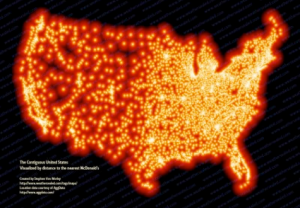 This week’s Fantastic Friday post was requested by a rellie. As you will see, the post explains very well why the Man of Steel felt like we lived on the edge of the world during our seven years in northwest South Dakota. BTW Gary, this is one of my favorite posts ever!
This week’s Fantastic Friday post was requested by a rellie. As you will see, the post explains very well why the Man of Steel felt like we lived on the edge of the world during our seven years in northwest South Dakota. BTW Gary, this is one of my favorite posts ever!
A recent entry at Justin Taylor’s blog Between Two Worlds almost blew my socks off. He quoted from a blog entry by Stephen Von Worley. Von Worley was contemplating the McDonaldization of America and decided to locate the farthest point from an Mc Donalds in the contiguous United States. Here’s what he found:
As expected, McDonald’s cluster at the population centers and hug the highway grid. East of the Mississippi, there’s wall-to-wall coverage, except for a handful of meager gaps centered on the Adirondacks, inland Maine, the Everglades, and outlying West Virginia.
For maximum McSparseness, we look westward, towards the deepest, darkest holes in our map: the barren deserts of central Nevada, the arid hills of southeastern Oregon, the rugged wilderness of Idaho’s Salmon River Mountains, and the conspicuous well of blackness on the high plains of northwestern South Dakota. There, in a patch of rolling grassland, loosely hemmed in by Bismarck, Dickinson, Pierre, and the greater Rapid City-Spearfish-Sturgis metropolitan area, we find our answer.Between the tiny Dakotan hamlets of Meadow and Glad Valley lies the McFarthest Spot: 107 miles distant from the nearest McDonald’s, as the crow flies, and 145 miles by car! Suffer a Big Mac Attack out there, and you’re hurtin’ for certain! For a coupla hours, at least, unless graced by the tender blessings of “manna from heaven” – that is, a fast food air drop from the Medi-Copter.
So what’s the big deal? Those “tiny hamlets of Meadow and Glad Valley” were part of our old South Dakota stomping grounds. Our personal hamlet, Camp Crook, was about 75 miles straight west of Meadow, much tinier than the McFarthest spot, and didn’t have nearly as many paved roads.
What were we doing for the first three precarious years of Allen’s life, living so far from civilization? Answer: We didn’t know how bad we had it. Like Stephen Von Worley, we thought the most isolated part of the United States was far, far away in the rugged west, not in our back yard.
If we had known the truth, would we have skedaddled sooner than we did? Maybe, but as Hiram said when he read the report, “There we were on the edge of nowhere and look at the support we received from the people.” Maybe they supported us because they weren’t distracted by civilization – McDonalds and movies and shopping malls and inconsequentials – and had time to prop up two bewildered young parents day after difficult day.
Whatever the reasons, when I think of our seven years near the McFarthest Spot and the way the far flung community rallied round us, the truth is evident. During those years we didn’t leave civilization. We found it.
If you have a favorite post you’d like to see featured on Fantastic Friday, leave a comment in the box below.

